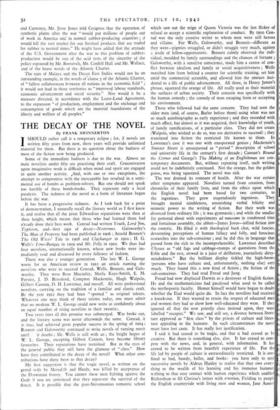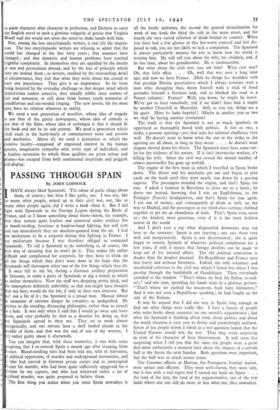THE DECAY OF THE NOVEL
By FRANK SWINNERTON Some of the immediate badness is due to the war. Almost no male novelists under fifty are practising their craft. Concentration upon imaginative work is difficult when mind and spirit are engaged in quite another activity. And, with one or two exceptions, the attempt to compromise with the inescapable has resulted in a senti- . mental use of bombs as problem-solvers. But one should not speak too harshly of these bomb-books. They represent only a local paralysis. The sickness of the novel as a form of literature began before the war.
It has been a progressive sickness. As I look back for a point
of demonstration, I naturally recall the literary world as I first knew it, and realise that all the great Edwardian reputations were then at their height, which means that those who had learned them had already done their best work. Conrad had written Youth, Lord Jim, Typhoon, and—first sign of decay—Nostromo. Galsworthy's The Man of Property had been published in 1906 ; Arnold Bennett's The Old Wives' Tale in 1908 and Clayhange-r in 1910 ; H. G. Wells's Tono-Bungay in 1909 and Mr. Polly in 191o. We thus had four novelists,. internationally known, whose new books were im- mediately read and discussed by every follower of fashion.
There was also a younger generation. The late W. L. George
wrote for an American review in 1912 an article naming the novelists who were to succeed Conrad, Wells, Bennett, and Gals- worthy. They were Rose Macaulay, Sheila Kaye-Smith, E. M. Forster, J. D. Beresford, Compton Mackenzie, Hugh Walpole, Gilbert Cannan, D. H. Lawrence, and myself. All were professional novelists, carrying on the tradition of a familiar and elastic craft. By the year 1912 they had been " spotted " as original talents. Whatever one may think of those talents today, one must admit that no modern W. L. George could now write as confidently about an equal number of rising novelists in their twenties.
Two years later all this promise was submerged. War broke out, and the literary scene was never afterwards the same. Conrad, it is true, had achieved great popular success in the spring of 194 ; Bennett and Galsworthy continued to write novels of varying merit until :" it deaths ; Mr. Wells is still with us ; the bright hopes of W. L. George, excepting Gilbert Cannan, have become library favourites. Their reputations have tarnished. But in the eyes of the general public they still have the glamour of " class." How have they contributed to the decay of the novel? What other con- tributions have there been to that decay?
My first suggestion is that the tragic novel, as written on the grand scale by Meredith and Hardy, was killed by acceptance of the Dirwinian theory. You cannot show men fighting against the Gods if you are convinced that they represent the survival of the fittest. It is possible that the post-Stevensonian romantic school which saw out the reign of Queen Victoria was the last flicker of refusal to accept a scientific explanation of conduct. By 1910 Con- rad was the only creative writer to whom men were still heroes and villains. For Wells, Galsworthy, and Bennett—different as they were—pigmies struggled, or didn't struggle very much, against a jostle of fellow-opportunists. Bennett calmly observed the indi- vidual, moulded by family surroundings and the chances of fortune ; Galsworthy, with a sensitive conscience, made him a centre of con- flict between idealism and family or social acquisitiveness ; Wells snatched him from behind a counter for scientific training, set him amid the commercial scramble, and allowed him the amours inci- dental to a life of public advancement. All three, in Henry James's phrase, squeezed the orange of life. All really used as their material the surfaces of urban society. Their concern was specifically with the human comedy ; the comedy of man escaping from or accepting his environment.
Those who followed had the same concern. They had seen the older men (and, of course, Butler before them) using what was not so much autobiography as early experience ; and they recorded with much effect, but almost as it was acquired, their knowledge of youth, of family ramifications, of a particular class. They did not create (Walpole, who wished to do so, was too derivative to succeed) ; they translated into fiction the restricted life known to them. In Lawrence's case it was one with exasperated genius ; Mackenzie's Sinister Street is unsurpassed as " period " description of school and university life in the century's first decade ; Cannan's Round the Corner and George's The Making of an Englishman are con- temporary documents. But, without repeating itself, such writing could not be indefinitely continued. Not the orange, but the golden goose, was being squeezed. The novel was sick.
The war drained its remnant of health. After the war certain other symptoms appeared. Novelists turned from creation, from chronicles of their family lives, and from the ethics upon which the English novel had been based for two centuries, to the ingenious. They grew stupendously ingenious. They brought mental nimbleness, astonishing verbal felicity and mimetic power to the writing of fiction. But their work was divorced from ordinary life ; it was gymnastic.; and while the smaller fry pottered about with experiments ad nauseam in condensed time and fortuitous assembly, the ablest—James Joyce—jollied fiction into the esoteric. He filled it with theological back chat, wild fancies, devastating perceptions of human fallacy and folly, and ferocious researches into the sub-conscious ; and he did this in language that passed from the rich to the incomprehensible. Lawrence described Ulysses as " old fags and cabbage-stumps of quotations from the Bible and the rest, stewed in a juice of deliberate, journalistic dirty- mindedness." But the brilliant display tickled the high-brows (persons who have culture and, unfortunately, nothing else) very much. They found this a new kind of fiction ; the fiction of the sub-conscious. They had read Freud and Jung.
Freud had now displaced Darwin as a destroyer of English fiction. He and the mathematicians had paralysed what used to be called the mythopoetic faculty. Homer himself would have begun to doubt whether the Iliad would quite do. In fact the novelists had received a knock-out. If they wanted to retain the respect of educated men and women they had to show how well-educated they were. If they ignored all that the new priestly class insisted upon, they were labelled "escapist." We saw, and still see, a divorce between litera- ture approved as "first class " by the priests of culture and litera- ture appealing to the humane. In such circumstances the novel must have lost caste. It has really lost justification.
I said it had ceased to be tragic, and that it had ceased to be creative. But there is something else, also. It has ceased to com- pete with the news, and, in general, with information. It has ceased to be written from heartfelt experience of life. For the life led by people of culture is extraordinarily restricted. It is con- fined to bed, bawdy, ballet, and books: you have only to read successive novels by Aldous Huxley to realise that they owe every- thing to the wealth of his learning and his immense humour. nothing to that easy contact with human experience which enabled Richardson to fill Clarissa's letters with emotion, Fielding to people the English countryside with living men and women, Jane Austen
to paint character after character to perfection, and Dickens to carry the English novel to such a glorious vulgarity of genius that Virginia Woolf said she would not cross the street to shake hands with him.
Nor, among the less encyclopaedic writers, is real life the inspira- tion. The less encyclopaedic writers are refusing to admit that the world has changed in the last forty years ; that manners have changed ; and that domestic and human problems have reached frightful complexity. In themselves they are appalled by the shocks of war and persecution abroad, and by the loss of principle which they see around them ; as writers, crushed by the encroaching detail of circumstance, they feel that what they write about has ceased to have any importance. They give it no importance. So far from being inspired by the everyday challenge to that deeper mind which dialecticians cannot conceive, they timidly nibble stray corners of fact and nonsense, or still draw from former youth memories of antediluvian and out-moded longing. The new novels, for the most part, have no relation whatever to reality.
We need a new generation of novelists, whose idea of tragedy is not that of the gutter newspapers, whose idea of comedy is not that of the films, whose idea of technique is that it should fit the book- and not be its sole pretext. We need a generation which shall exult in the hurly-burly of contemporary noise and passion and mechanics. Above all, we need a generation in which the reative faculty—composed of engrossed interest in the human pecies, imaginative sympathy with every type of individual, and fearless invention by which these qualities are given colour and ama—has escaped from both sentimental ineptitude and priggish • elf-display.



























 Previous page
Previous page